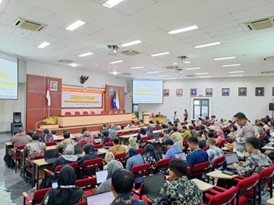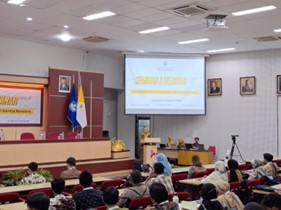
Yogyakarta (20/8), the Transportation Policy Agency and the Directorate General of Railways, Ministry of Transportation, in collaboration with Gadjah Mada University, held a seminar entitled “Socialization and Evaluation of the Achievements of the Railway Transportation Sector 2015 – 2024, Series 1: Urban Trains and Airport Trains.” This event took place in a hybrid manner at the Gadjah Mada University Postgraduate School Auditorium with the aim of improving the performance of the railway transportation sub-sector.
This seminar featured an interesting presentation by Awang Meindra, S.SiT., MT, Head of the Traffic Sub Directorate, who represented Mohammad Risal Wasal, Director General of Railways. The discussion focused on “Government Obligations in Providing Public Services in the Railway Sector 2015-2024 and Future Plans,” with an emphasis on urban railways and airports.
“The advantages of trains as a mode of transportation are high carrying capacity, regularity, energy efficiency, safety integration and space optimization. “These factors contribute significantly to the Sustainable Development Goals (SDGs), especially in terms of access to education and equal access to transportation,” said Awang Meindra when delivering his presentation.
The government’s role in organizing railways is very important, because the government determines the legal framework and terminology that regulates rail transportation services. The government is responsible for overseeing the development and management of the railway sector, ensuring that this sector remains controlled by the state to serve the public effectively.
One of the interesting things conveyed during the seminar was regarding the Public Service Obligation (PSO) provided by the government by ensuring affordable rail transportation services for the community. This initiative aligns with the SDGs by promoting equal access to transport, which is critical for educational and employment opportunities.
In the future, the government plans to implement targeted subsidies for Jabodetabek commuter trains. This decision was taken in response to the increasing budget requirements for PSOs in the railway sector. The government is aware of the need to optimize subsidy allocation to make it more targeted and effective.
Capacity building in the railway sector is also an important topic of discussion. The government aims to improve the skills and knowledge of personnel involved in railway operations, ensuring that they are ready to face the challenges of modern transport demands. This initiative is critical to driving development-oriented policies that support long-term growth and sustainability.
This seminar serves as a platform to discuss the government’s obligations in the railway sector and future plans to improve public services. With a focus on sustainable practices, equal access and effective policies, the government aims to create a strong rail system that meets society’s needs while contributing to broader economic and environmental goals.
Tags: railway system, public service obligation, Jabodetabek commuter, sustainable energy sources, SDG 4: quality education, SDG 7: clean and affordable energy, SDG 9: industry, innovation and infrastructure, SDG 10: reducing inequality, SDG 11: cities and sustainable settlements, SDG 12: responsible consumption and production, SDG 16: peace, justice and resilient institutions, SDG 17: partnerships to achieve the goals
Author: Siti Muyasaroh

